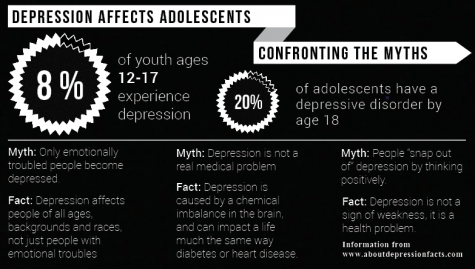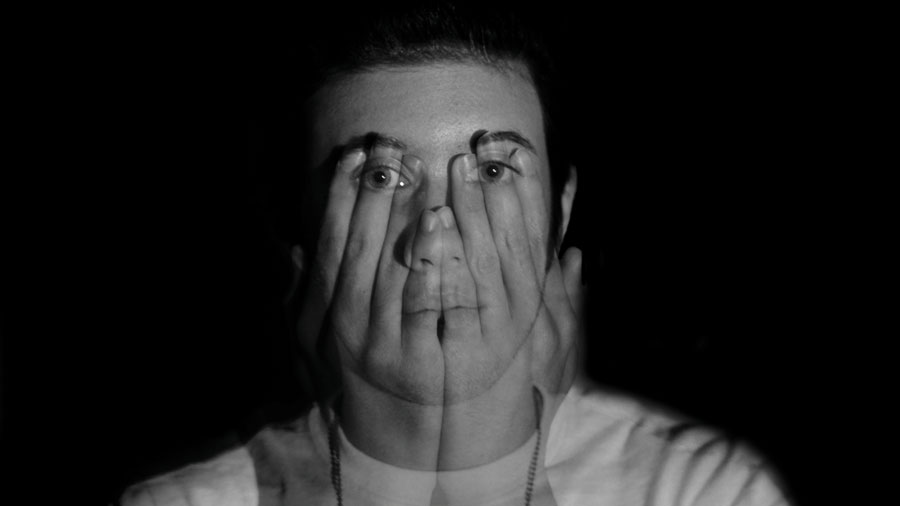Behind the mask
Accepting the realities of anxiety and depression
October 20, 2014
The pain becomes overwhelming. Even the simple task of getting out of bed for school hurts. For her, the worst part is not understanding. Not understanding where the pain comes from, why it exists or how to stop it. She lacks the resources to get the help she needs and feels unable to express what she is going through. Even though she is struggling, she must continue to balance school, extracurricular activities and family. This is the everyday reality for some students who struggle with depression.
“While I was in the depths of my illness, there was absolutely no motivation,” a senior who struggles with depression and anxiety, who will go by Lucy said. “Getting out of bed was a struggle. Taking my pills was a struggle. Everything felt like a big struggle, and for a while, I didn’t want to get better.”
According to Teen Mental Health, one in five young people suffer from mental illness. The American Psychiatric Foundation also reports that suicide is the third leading cause of death for people between the ages of 14 to 22. The National Strategy for Suicide Prevention reports that more adolescents die from suicide than cancer, heart disease, AIDS, birth defects, stroke, pneumonia, influenza and chronic lung disease combined. With these growing numbers, several communities have taken the time to understand those suffering, provide support and raise awareness.
“Awareness is key,” senior Ginnifer Joe said. “If people took the time to understand these conditions, then those suffering would realize that there is help. It’s just a matter of remembering that every person deserves to be loved, no matter what they struggle with.”
Silently Suffering
The National Alliance on Mental Illness reports that 60 percent of adults who struggle with mental illness received no mental health services last year. Lucy believes that sufferers hide their emotions on a daily basis out of fear.
“People are afraid of judgment,” Lucy said. “They’re afraid that there’s nobody out there like them; afraid that nobody will accept them the way they are. As a person who has fought against depression and anxiety, it’s extremely hard for me to crack my shell and tell people how I feel. I’m afraid of receiving judgment rather than help, and I know I’m not the only one who feels that way.”
Lucy thinks this extreme fear comes from the way society views mental illness and its reluctance to talk about it. The Center for Disease Control and Prevention reports that only 25 percent of adults with mental illness symptoms believed that people would be caring and sympathetic toward their condition. Lucy believes this lack of trust is what brings the strong feelings of fear.
“Society views people struggling with mental illness as attention seekers,” Lucy said. “They simply don’t believe in it. Anxiety is a thing. Depression is a thing. People may not fully understand it because they haven’t experienced it, but they still need to know that it’s out there, and it’s extremely dangerous.”
The complexity of these conditions and society’s view of them can cause gaps in understanding and fear of opening up, according to Joe.
“Society’s outlook is negative on things like mental illness, because not everyone understands the complexity of them,” Joe said. “If society became more aware of the complexity of the problem, we could open up the conversation, and get people the help they need.”
Advocating and Awareness
The National Alliance on Mental Illness reports that nearly half of the public reports knowing only a little or almost nothing about mental illness. They report that this lack of knowledge causes those suffering to feel alone, insecure and afraid.

Students suffering with depression often feel the need to mask their true emotions.
Lucy feels that without raising awareness, those suffering will continue to suffer in silence. She said that the most important thing society can do to help those who struggle is to raise awareness and open up the conversation.
“Nobody will bother to help the struggles if they don’t know that they’re struggling or what they’re struggling with,” Lucy said. “People need to be aware of their surroundings, because many are oblivious to what’s going on around them. Many people walk around with a smile plastered on their face, but they’re struggling on the inside, and people don’t see that.”
Ignoring these disorders only worsen the problem, according to Emily. She said people should not be afraid to address these issues and speak up.
“I feel if people discuss the area surrounding mental disorders, they can help people feel less afraid,” Emily said. “People should stop blaming the person with the disease and emphasize how these are real diseases.”
Although Emily feels society is becoming more aware of mental health issues, it has a long way to go.
“Society is slowly but surely becoming more open to dealing with things like mental disorders,” she said. “Information-wise though, we are still excluded. I personally dislike the stereotypes associated with mental illness and feel that society needs to address and begin solving this issue.”
Help and Healing
One-half of youth, ages 8-15, who struggle with mental illness receive no form of treatment, according to the National Alliance on Mental Health. While several factors could be the cause of these low numbers, Castillo believes that getting help is essential for those suffering with these illnesses.

Infographic by Svannah Nguyen
“I think it’s important for students to know that they don’t have to go through anything alone,” Castillo said. “There are adults that are trained to help. Students should find a trustworthy adult to talk to. There are people out there to help, whether it’s a counselor, teacher, parent or family member.”
As an individual who has seen loved ones struggling with mental illness, Joe believes that helping them get the help they need is the best form of support.
“The worst thing about seeing someone I love suffering is understanding that I can’t fix the problem,” Joe said. “It’s hard to watch someone I love and care about deeply suffer. All I can do for them is provide them with constant love, support and the resources for getting help. Every person deserves to be loved and helped.”
From personal experience, Lucy knows that these resources can change lives. She feels thankful to have received the help she needed, when she needed it, and feels that no one should hesitate to reach out.
“Mental illness is not something that can be fixed with a crack of a whip,” she said. “Those struggling should reach out to friends, family and loved ones. My biggest advice is to never lose hope. People shouldn’t let the world bring them down, because they are loved and someone will always be there to help them.”
For more information, discussion and resources for depression and anxiety visit www.mentalhealth.gov.
